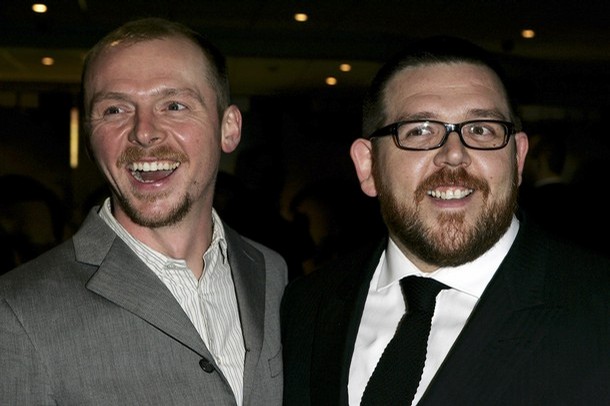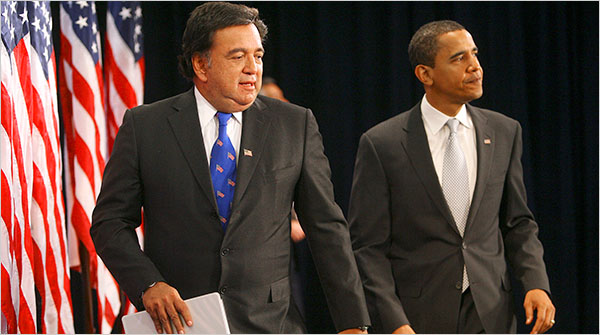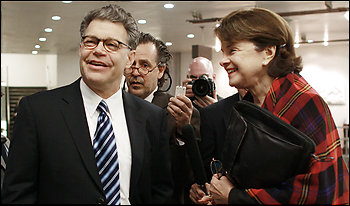Strangelove much? The Japanese trailer for Zack Snyder’s Watchmen is now on the tubes, which contains some spoilery-type new footage if you haven’t read the graphic novel. (Note also the new Minutemen featurette on the official site.) Interesting that this trailer foregoes all the Dr. Manhattan-exemplifying-American-might stuff in favor of more emphasis on the alternate history and Cold War doomsday clock.
Month: January 2009
Wonder Twins Activate.

Doctor, doctor, can’t you see they’re burning, burning? I missed this rumor when it first got some run last September, but apparently AICN has confirmed it: Fanboy brothers-in-arms Simon Pegg and Nick Frost of Spaced, Shaun of the Dead, and Hot Fuzz have been cast as the Thompson twins in the forthcoming PJ/Spielberg Tintin films. Now that’s great casting, particularly as they’re pretty much impossible to tell apart.
In other Tintin news I missed, Thomas Sangster (a.k.a. Tintin) is now off the project due to scheduling conflicts (and writer Steven Moffat also left to pursue Who.) But Andy Serkis is still Haddock, and Jackson and Spielberg are still directing the first two installments.
Risky Business.
“What’s interesting about the Madoff scandal, in retrospect, is how little interest anyone inside the financial system had in exposing it…OUR financial catastrophe, like Bernard Madoff’s pyramid scheme, required all sorts of important, plugged-in people to sacrifice our collective long-term interests for short-term gain. The pressure to do this in today’s financial markets is immense. Obviously the greater the market pressure to excel in the short term, the greater the need for pressure from outside the market to consider the longer term. But that’s the problem: there is no longer any serious pressure from outside the market.“
In an extended NYT editorial, authors Michael Lewis and David Einhorn survey recent economic developments with an eye to the broader problem: a financial institutional culture that fosters and legitimates idiotic amounts of risk. “The fixable problem isn’t the greed of the few but the misaligned interests of the many…The tyranny of the short term has extended itself with frightening ease into the entities that were meant to, one way or another, discipline Wall Street, and force it to consider its enlightened self-interest.“
Among the culprits in Lewis and Einhorn’s worthwhile dissection: the credit rating agencies. “In pursuit of their own short-term earnings, they did exactly the opposite of what they were meant to do: rather than expose financial risk they systematically disguised it. ” See also: the S.E.C. “Created to protect investors from financial predators, the commission has somehow evolved into a mechanism for protecting financial predators with political clout from investors…And here’s the most incredible thing of all: 18 months into the most spectacular man-made financial calamity in modern experience, nothing has been done to change that, or any of the other bad incentives that led us here in the first place.“
It’s not all doom, gloom, and (highly justified) finger-pointing. In part two of the editorial, Lewis and Einhorn offer some quick fixes to our current institutional myopia that should be relatively simple to put through…in a perfect world. “The funny thing is, there’s nothing all that radical about most of these changes. A disinterested person would probably wonder why many of them had not been made long ago. A committee of people whose financial interests are somehow bound up with Wall Street is a different matter.“
Richie Richardson?

In the latest round of pre-inaugural musical chairs, Virginia governor Tim Kaine is new head of the DNC, former Clinton chief of staff Leon Panetta is in at CIA…
…and Governor Bill Richardson is out at Commerce. “‘Given the gravity of the economic situation the nation is facing,’ the governor said, ‘I could not in good conscience ask the president-elect to delay for one day the important work that needs to be done.’” [Official Statements.] Um, ok…but how has the situation on the ground changed in the past month or so? It doesn’t seem like this investigation into a possible pay-to-play deal in New Mexico snuck up on anyone, and, at least according to Mother Jones, Richardson may have a history of this potentially sordid behavior. One would think Gov. Richardson could have rejected the offer of Commerce when it was first presented to him, not so very long ago.
At any rate, with Richardson now looking suspect, that means two of our 2008 Dem Final Four — the other, of course, being John Edwards — were harboring potential general-election-killing scandals that they didn’t see fit to tell anyone about. (That number rises to two and a half if you count the recent brouhaha involving developer Robert Congel and the Clinton foundation, but that one sounds iffier to me, in part because Congel donated money well after the potential favors were bestowed.) Really, what’s wrong with these people? Is it too much to ask that these so-called statesmen take their own shadiness into account before playing dice with our future?
Well, one would hope this and Blagojevich’s recent antics will further press on our party the need for comprehensive lobbying, ethics, and campaign finance reform, and soon. These may be state-level scandals, but they’re also indicators of a broken system that’s awash in — and often only responds to — money. And, now that we’ll soon be running both ends of Pennsylvania Ave. again, the last thing we need is to follow the GOP down their low road of avarice and ignominy.
In Minn: Cold, Mirth, and Franken (Sen).

With the recount winding down and enraged Republicans frothing up — where was this outrage in Dade County eight years ago? — it seems that Democrat Al Franken is up by 225 votes, and is likely slated to be the next Senator from Minnesota. Several potential legal challenges remain in the arsenal of Republican Norm Coleman (who also happens to be trying to fend off an FBI bribery investigation at the moment), but apparently it’s hard to see any outcome from these proceedings that will avail him the needed margin of victory.
So, Franken it is, then. Great, another Dem in the Senate is always excellent news. That being said, perhaps we should view recent events in Minnesota as the umpteenth wake-up call for this country to get its voting infrastructure in order? If I go take out a hundred bucks from an ATM at the local 7-11, I never have to wait in line for hours. The record of my transaction never goes missing, get displaced, or ends up being double-counted. I’ve got a paper trail of the withdrawal, and my bank and/or creditors in their faraway lands know the score immediately — there’s no waiting two months to tally up my recent expenditures. Truly, this is an Age of Wonders.
While taking into account some system of anonymity that will maintain the secret ballot, perhaps we can find a way to apply this magical 21st-century technology to the voting process? Heck, at this point I’ll settle for applying 20th century tech to the problem.
Farewell to the Commish.
“He was awake one moment, and in the next breath, he was gone.” Pat Hingle, a veteran character actor probably best known as Commissioner Gordon in Tim Burton’s Batman, 1924-2009.
Situational Ethics II: Yoo So Crazy.
“We hope the new vice president will not reverse his commitment to the Senate’s constitutional authority.” Uh, the new one? What about the old one? First it was Karl Rove discovering the virtues of executive transparency. Now the walrus and the carpenter of Dubya apparachiks, Johns “Bomb Iran” Bolton and “Torture at will” Yoo respectively, actually have the temerity to sing the praises of congressional oversight in foreign policy. “If Mr. Obama were to submit either of these agreements for approval by a simple majority of the House and Senate, his actions would pose a serious challenge to American principles of law and democratic governance.” Oh, a “serious challenge” to law and democracy, eh? These assholes have no shame.
Mutiny in the Wehrmacht.

In mid-1944, the shadow of failed artist-turned-meglomaniacal psychopath Adolf Hitler still falls heavy across the continent, and, even as the Allies gather in North Africa, Italy, and the coast of Normandy, the Fuhrer maintains an iron grip over the oppressed peoples of Europe. As most everyone remembers from school days, Hitler was able to retain his power base in Germany, even amid the darkening gloom on both fronts, by ruthlessly organizing and consolidating the nation’s elite cadre of disgruntled character actors. Some of these character actors (Kenneth Cranham, Tom Hollander) rejoice in their servitude, and serve their Nazi master with an obsequious relish. Some of them (Tom Wilkinson, Thomas Kretschmann, Eddie Izzard) just look to keep their head down (for fear of losing it) and basically play go-along-to-get-along. But some character actors resisted. And as the likes of Kenneth Branagh, Bill Nighy, and Terrence Stamp see their various attempts to unseat Hitler fail due to bad luck, poor timing, or compromised plotters, it becomes abundantly clear what they need to achieve their goal of regime change: a lead actor.
Enter Tom Cruise, otherwise known as Count Claus von Stauffenberg, a Catholic aristocrat who’s been shipped off to the now-doomed North African front for his free-thinking transgressions. (The Fuhrer’s resident character actor in charge there is Bernard Hill, a.k.a. Theoden king, and he still can’t run a battle without timely lead actor advice.) Horribly wounded in an Allied bombing raid, Cruise/von Stauffenberg loses an eye, a hand, and several fingers, but — for his service (and his very reputable name) — gains access to the Fuhrer himself, after some machinations by the plotters. As such, leadership of the proposed coup eventually falls out of the hands of the character actor conspiracy and upon him. “I am involved in high treason with all means available to me,” he tells one aide at his job interview, “Can I count you in?” In other words, enough monologuing already! What Germany need now is emoting and stunt work.
If it seems I’m being a bit glib about a story that indirectly involves millions of deaths, untold destruction, and (tho’ it’s only obliquely mentioned at the beginning) systematic genocide, well I apologize. Along with the Titanic-type sensation of continually “waiting for the iceberg” throughout Valkyrie, it’s really hard to sit through the film without recollecting the ubiquitous and consistently funny Bruno Ganz in Downfall meme. (See also the Cowboys, Warcraft, Burning Man, eBay, Wikipedia, Ronaldo, Youtube, etc.) It could be worse, I suppose: For the many citizens out there who see Tom Cruise and now can’t stop thinking “Scientology,” I can safely report that he’s fine in the role — it helps that both he and his character both answer to a higher power (and have a touch of the zealot about them) — and that the accent problem is handled smoothly (a la Hunt for Red October.)
I should say, before this “review” degenerates any further into pop culture musings, that the real historical facts of this story are fascinating. The plotters of this assassination attempt aren’t really visionary idealists or radical bomb-throwers — Hitler had already rounded up or murdered most of them — but the conservative-leaning remnants of the military and aristocratic hierarchies displaced by the Nazi regime. (The 20 July plot is basically crafted by generals and led by Junkers.) And the engine of their coup attempt is ingenious: The plotters almost succeed in converting Operation Valkyrie, Hitler’s last-ditch plan to stay in power should the roof cave in, into the machinery of his demise. Finally, these German patriots get sooo close to their goal that, had any one of several tiny contingencies played out even slightly differently, the history of the war (and its aftermath) would have been irrevocably transformed. As happens surprisingly often, it seems, the fate of the world is a game of inches.
All that being said, I found all of this information equally fascinating while watching the History Channel special after the film, so I’m not sure it really recommends the movie itself in the end. Singer’s Valkyrie is a smart, well-meaning two hours of cinema, and I was reasonably edutained by it, but at best I’d say it’s one for the Netflix queue.
Who What Now?

Benjamin Button isn’t the only fellow growing younger these days: Official word just came down from the BBC powers-that-be that 26-year-old Matt Smith has been cast as the next iteration of Doctor Who, for Stephen Moffatt’s first full season as showrunner, beginning in 2010. (David Tennant will still be holding down the fort for a few more specials in 2009 — he regenerates next Christmas.)
Well, I don’t know anything about this fellow, so I can’t really evaluate the pick until I’ve seen him face down a few Daleks and the like. But given the A-lister and outside-the-box names that have been floating around over the past few weeks (James McAvoy, Bill Nighy, Chiwetel Ejiofor, Catherine Zeta Jones, etc.), it’s hard not to feel slightly disappointed about this. Ah well, I’ll manage.
Button-Mashing.

To switch up metaphors, Button is a dazzling contraption at times, to be sure…but a contraption it remains. Unlike Milk, which felt alive in every moment of its run, the stately, strangely inert Button — despite trying to wring emotion from more death scenes than your average season of Six Feet Under — moves to a tidy, mechanical, and clockwork pulse that ultimately feels pretty far removed from the messy emotions and drawing-outside-the-lines sensations of real life. Fincher, the actors (particularly Brad Pitt, Cate Blanchett, and Taraji P. Henson), and the special effects team put forth an undeniably impressive effort, but as the movie progresses, it starts to feel more and more like what it in fact is: well-made but sloppily written Oscar bait. And the more you think about Button, the less it holds together.
Trade out feathers for hummingbirds, and The Curious Case of Benjamin Button is, for all intent and purposes, Forrest Gump. (Indeed, while Button began as a Fitzgerald short story, the two films share a screenwriter in Eric Roth. It shows.) After a Katrina-era framing device is established, involving an old, terminally ill woman sharing her last few moments with her daughter (Julia Ormond) in a New Orleans hospital, we head back to 1918 and the end of World War I, as Benjamin Button begins to recount his tale…with a Gumpish southern drawl, no less. Born “under unusual circumstances” and left at the doorstep of the local old folks’ home, Button (Pitt, good but something of a cipher), as you probably know by now, ages backwards — He begins life as a very old baby and grows younger over time, like Dick Clark or the Bob Dylan song. (I’ve skipped over a short story involving Teddy Roosevelt and a distraught clockmaker (Elias Koteas) which, with the final visual payoff of the Katrina angle, may actually be the most beautiful and affecting part of the film.)
The central conceit established, Button’s life then proceeds to follow a surprisingly Gumpian course. Raised by his take-no-guff, God-fearin’ mama (Taraji P. Henson, a much-needed breath of life throughout) and considered a “special child” by all around him, Button eventually embarks on a series of grand adventures. He hooks up with a gruff but lovable sea captain (Jared Harris, nothing at all like Lt. Dan) who teaches him the ways of the world. He eventually finds himself in the midst of war, and spends several years traveling by himself all around the globe. And throughout his days, he finds himself continually drawn to his childhood friend turned free spirit, Jenny…uh, Daisy (Blanchett, graceful, alluring and thoroughly unDylanesque). But Daisy, like the rest of us, is aging along the usual lines. (Indeed, given that Daisy is a prima ballerina, her window of time seems that much shorter and more precious.) How can Benjamin and Daisy forge anything lasting when they’re at best two ships passing in the night? However happy they are at any given moment, time is against them and they know it. And time, whether one ages backwards or forwards, has a way of inexorably marching on.
There are scenes (such as Daisy trying to seduce Benjamin through dance one midsummer night) and vignettes (such as Benjamin and Tilda Swinton in their own version of Lost in Translation) that are eminently engaging throughout, and yet The Curious Case of Benjamin Button ultimately seems to add up to less than the sum of its parts. (This is particularly true of the last hour, where it begins to devolve into an interminably long Abercrombie & Fitch ad.) Part of the problem is that the script starts beating its central thesis — “time keeps slipping, slipping, slipping into the future” — into the ground after awhile. But, even allowing for that, there are clumsy plot holes throughout. Ben and Daisy (well, Ben) reach a decision near the end of the film that makes zero sense from any perspective, other than to add further poignancy to their romance. Characters are created (Benjamin’s sister, Julia Ormond’s dad) that seem to have no other purpose than to drive the story along, and disappear as soon as it’s convenient.
Taking a step back from the basic plot mechanics, Button often seems confused about what it really wants to say. At times, it veers in the direction of “No fate but what we make“…ok, I’m all for free will. Later, in the middle going, it digresses in Paris for a visually arresting but totally-out-of-left-field Amelie-style reverie on the cruel vagaries of luck. (Which seems clever, until you realize that the entire sequence makes no sense given that we’re meant to have been reading from Button’s diary the whole time.) But if free will and/or randomness is the order of the day, then why do Ben and Daisy seem to keep circling each other all their lives (and why do so many second-tier characters seem to hold down the same jobs their parents did?) Is it…fate? I wasn’t expecting Button to come up with a unified theory of the universe or anything — Life sure doesn’t have one that I’m yet aware of. (Ok, other than “life is a box of chocolates,” etc. etc.) But the movie is so emphatic and precise about the short term points it’s making that, taken as whole, it all seems a bit poorly thought through.
Now, The Curious Case of Benjamin Button isn’t a disaster by any means. In fact, it’s one of the most sumptuously filmed movies I’ve seen this year. Still, as I walked out of the theater — and even more in the days since — I found the film wanting. At first, I assumed the problem was Fincher, who’s a quality director (Zodiac, Fight Club) but whose style might’ve been too cool, clinical, and remote for this particular project. But, the more I think about it, it was probably Fincher’s distance and reserve that prevented Button from becoming an unwatchable schmaltzfest. (Roth seems the real culprit.) In any case, Benjamin Button is a likable lad who shows occasional flashes of real potential. But, other than that whole aging-young thing, he unfortunately doesn’t end up seeming all that special.


